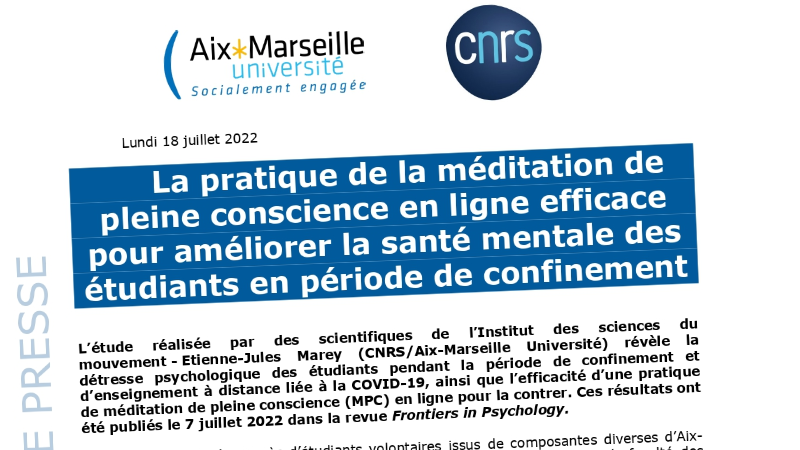
This study by scientists at the Institut des sciences du mouvement Etienne-Jules Marey (CNRS/Aix-Marseille Université) reveals students' psychological distress during COVID-19-related lockdown and distance learning, as well as the effectiveness of an online mindfulness meditation practice in countering it. These findings were published on July 7, 2022 in the journal Frontiers in Psychology.
The study was conducted among volunteer students from various components of Aix-Marseille Université (Faculty of Sports Sciences, Polytech Marseille, Inspé, Faculty of Sciences) pursuing their education from L3 to M2 at a distance, as imposed by the sanitary measures in force during the second lockdown related to COVID-19, in December 2020.
First, the researchers assessed the impact of the health crisis context on students' mental health (stress, anxiety, depression, well-being) and attentional performance via the use of questionnaires and an online cognitive test. A significant proportion of the students surveyed showed worrying scores on the psychological level, falling into the severe to extremely severe category (respectively 24% for stress, 20% for anxiety and 18% for depression). In addition, 70% of them had a well-being score below the average of French students outside the COVID-19 period. These results confirmed the presence of unprecedented psychological distress among the students, who had to face restrictions impacting their personal, social and academic life. However, no deficit in their attentional capacities was observed, as these were potentially preserved thanks to the cognitive stimulation provided by the pedagogical continuity plan, implemented in the form of distance learning.
The researchers then investigated the effectiveness of an online mindfulness meditation (MBM) intervention in countering the psychological difficulties observed in students in this restrictive and anxiety-provoking context. MBM is a secular mental practice that is part of the mainstream of alternative, non-drug therapies. It consists of paying attention to the present moment (thoughts, sensations, emotions), without expectation, without filter and without judgment. Half of the students included in the study were randomly assigned to an online MBM program, developed in collaboration with an online guided meditation specialist, while the other half continued their normal daily activities. The program consisted of daily sessions, for 17 days, accessible through a secure digital space, lasting 20 minutes during the week and 10 minutes on weekends. They included exercises focused on breathing, acceptance and positive emotions. At the end of the 17 days, only students who completed the MBM intervention significantly reduced their levels of stress, depression, and anxiety and improved their level of well-being, relative to their baseline levels.
This study provides awareness of the psychological distress of students in a pandemic setting where this population was not considered at risk from the virus itself. It also offers promising prospects in terms of psychological risk management and prevention, showing the effectiveness of mindfulness meditation (MBM) in coping with stressful times, such as the COVID-19 health crisis.
For more information: Devillers-Réolon L, Mascret N, Sleimen-Malkoun R (2022). Online mindfulness intervention, mental health and attentional abilities: A randomized controlled trial in university students during COVID-19 lockdown. Front. Psychol. Sec.Positive Psychology. doi: 10.3389/fpsyg.2022.889807.
Researcher Contact:
Institut des sciences du mouvement – Etienne-Jules Marey
Rita Sleimen-Malkoun - rita.sleimen-malkoun[at]univ-amu.fr

